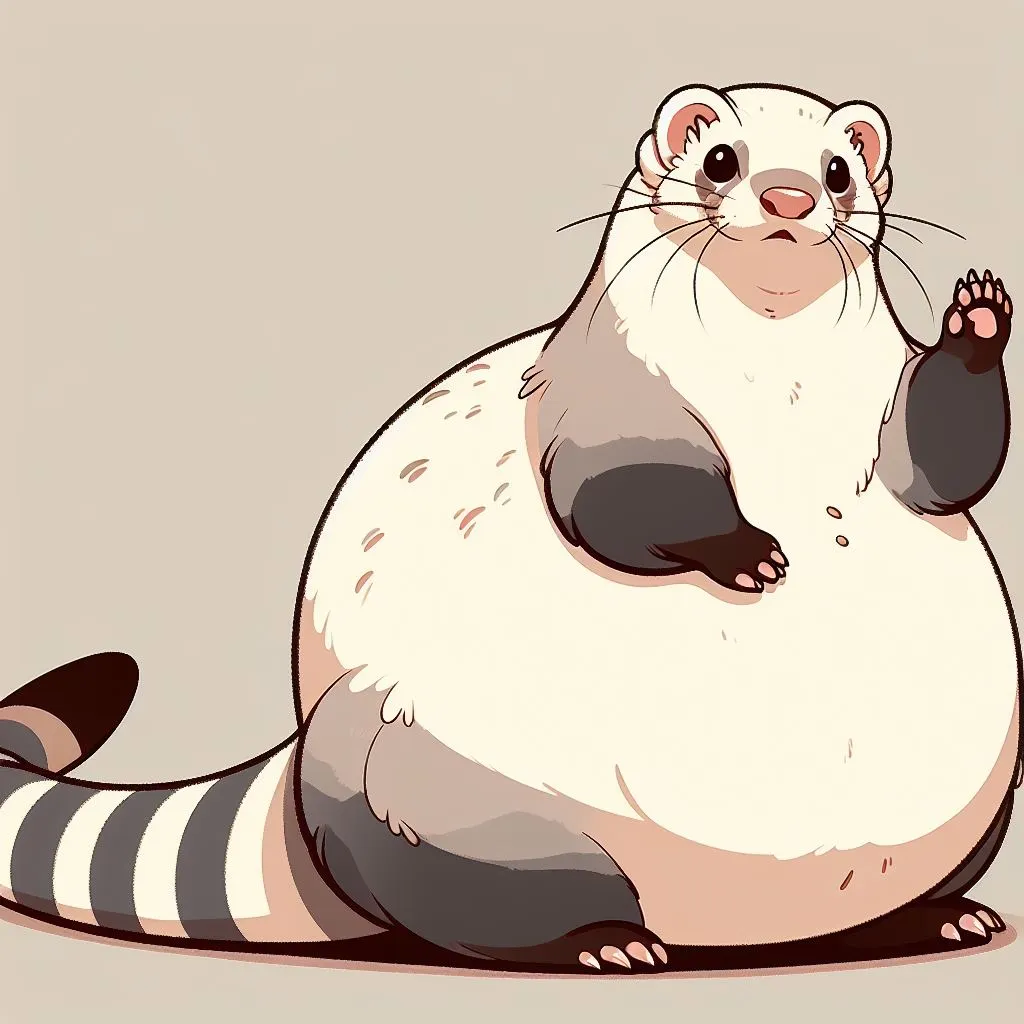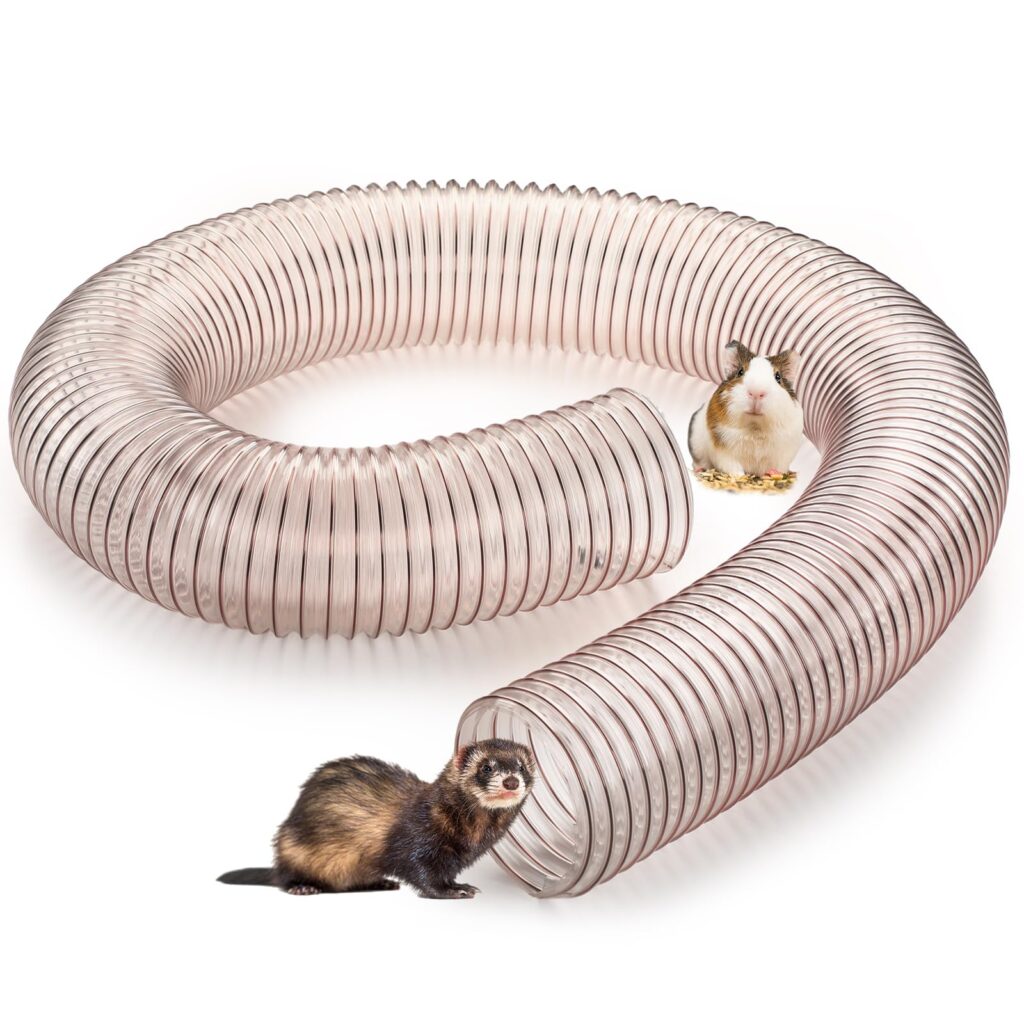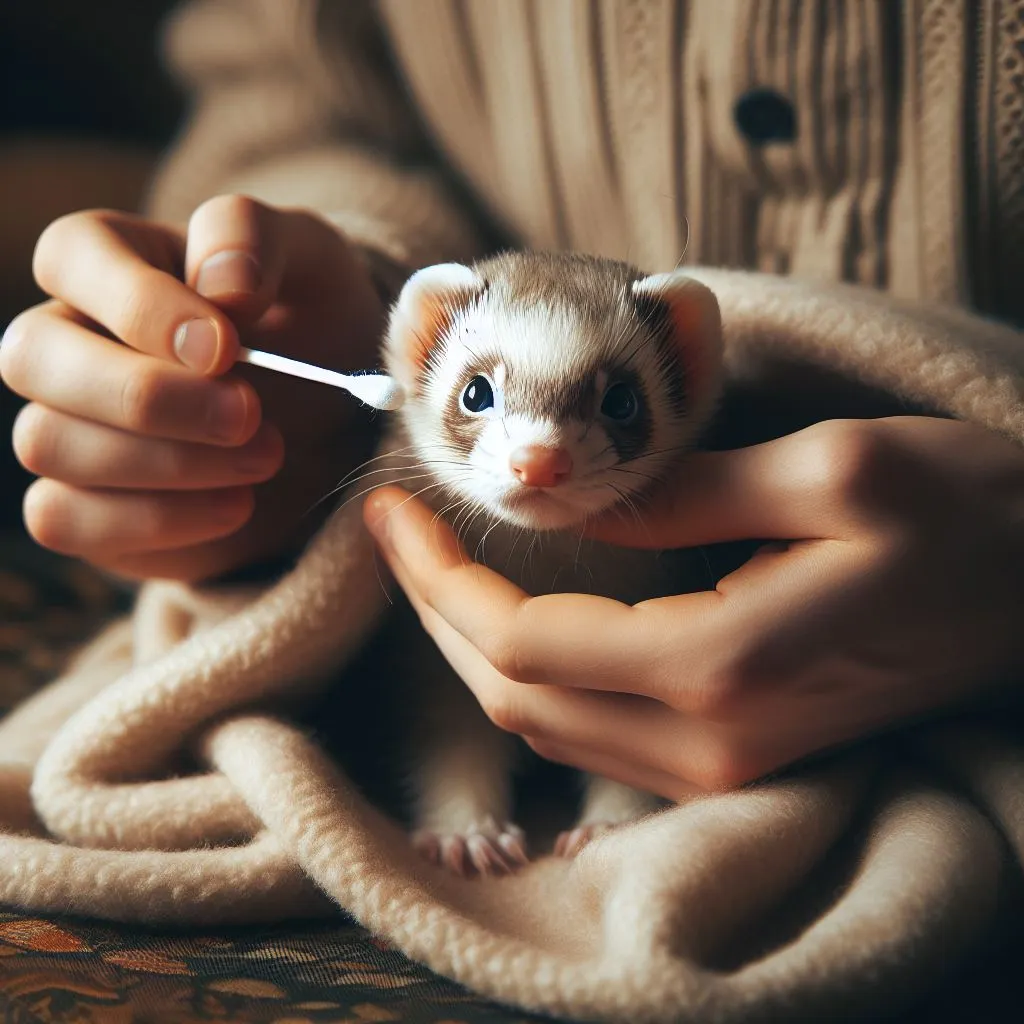Fat Ferret | Why Your Ferret Might Be Obese

Are you curious about why your ferrets are getting fat ? These adorable and unusual pets have been gaining attention for their distinctive appearance and charming personalities.
Whether you’re a seasoned pet owner or considering a new addition to your family, understanding the ins and outs of these delightful creatures will provide valuable insights into their world.
Topics Covered In This Article
- Recognizing Obesity in Ferrets
- The Role of Diet in Ferret Weight Management
- Nutritional Needs of a Healthy Ferret
- Common Diet-Related Health Issues in Ferrets
- Creating a Balanced Meal Plan for Your Ferret
- The Importance of Exercise for Ferrets
- Fun and Engaging Activities for Ferrets
- Monitoring Your Ferret’s Weight and Health
- Tips for Maintaining a Healthy Weight in Ferrets
- Closing Thoughts
- Frequently Asked Questions
Recognizing Obesity in Ferrets
Lack of Waistline
A fat ferret may have a round, bulging appearance without a defined waistline. This is due to the excess fat accumulating around their abdomen. The lack of a visible waistline can be an indication that the ferret is overweight.
When a ferret has a lack of waistline, it means its body appears more cylindrical than tapered. This can make it challenging to distinguish between the chest and abdomen, unlike healthy ferrets with a noticeable narrowing at the midsection.
Difficulty in Movement
Obese or overweight ferrets may experience difficulty moving freely. They might struggle with activities such as running, climbing, or even walking short distances. If you notice your pet having trouble engaging in physical activities they once enjoyed, it could be an indicator of obesity.
Ferrets are naturally playful and agile animals; however, when they become overweight, their mobility becomes limited. Difficulty in movement can manifest as reluctance to play or exercise and reduced interest in exploring their environment.
Weakness
Ferrets that are obese might have develop some weakness due to the excess weight that they have to carry around anywhere they move.
This can cause more energy to be expended than the usual amount that leads to weakness. Your ferret won’t like to play with the toys or move around a lot at all if it’s suffering from weakness due to excess weight.
The Role of Diet in Ferret Weight Management
High-Protein, Low-Fat Diet
Ferrets need a diet that is high in protein and low in fat to maintain a healthy weight. This means feeding them specially formulated ferret food that is rich in protein, such as meat-based products. Avoid giving them fatty foods like dairy products or oily treats.
A diet with the right balance of protein and fat helps ferrets stay lean and energetic. For example, you can choose commercial ferret food that contains at least 30-40% protein and less than 20% fat to ensure they get the nutrients they need without excess calories.
Limiting Sugary Treats and Snacks
It’s crucial to limit sugary treats and snacks when managing your ferret’s weight. While it may be tempting to offer sweet treats occasionally, too much sugar can lead to weight gain and other health issues for your furry friend.
Instead of sugary snacks, focus on providing your pet with nutritious options like small pieces of fresh fruits or vegetables as occasional treats. These items should be given sparingly due to their natural sugar content.
Offering Fresh Water at All Times Ensuring access to fresh water at all times is essential for maintaining your ferret’s overall health, including their weight management. Always make sure there is clean water available in their cage or play area so they can stay hydrated throughout the day.
Nutritional Needs of a Healthy Ferret
Protein Requirements
Ferrets need 30-40% of their diet to be protein. This is essential for their overall health and wellbeing. Foods rich in protein include high-quality meats like chicken, turkey, and lamb.
Protein-rich treats such as freeze-dried meat or eggs can also be given to ensure the ferret’s protein intake is met adequately.
Importance of Taurine
Taurine is crucial for a ferret’s heart health. It’s important to ensure that the ferret’s diet includes adequate amounts of taurine. Commercial ferret food often contains added taurine, but it’s advisable to check the label just to be sure.
A homemade diet should also include sources of taurine, such as dark poultry meat or heart muscle from various animals.
Common Diet-Related Health Issues in Ferrets
Insulinoma Risk from High Sugar Intake
Ferrets are prone to developing insulinoma due to their inability to process high amounts of sugar. This condition occurs when the pancreas produces too much insulin, leading to low blood sugar levels. It’s important for ferret owners to be mindful of the amount of sugary treats they give their pets.
Foods like fruits and certain commercial treats can contain high levels of sugar, which can contribute to the development of insulinoma in ferrets.
Foods with excessive amounts of simple sugars such as glucose and fructose should be avoided as they can lead to a spike in insulin production, stressing the pancreas and potentially causing long-term health issues for these small mammals.
Bladder Stones Caused by Improper Diet
Another diet-related issue that ferret owners need to watch out for is the formation of bladder stones. These stones can develop when a ferret’s diet lacks proper hydration or includes an excess of minerals that lead to stone formation. A diet rich in dry kibble without adequate water intake may contribute significantly to this problem.
Owners must ensure their pet has access to fresh water at all times and consider incorporating wet food into their diets, as it contains higher moisture content compared to dry kibble. Avoiding foods with excessive mineral content such as calcium oxalate is crucial in preventing bladder stone formation.
Creating a Balanced Meal Plan for Your Ferret
Premium Ferret Food Or Treat
Start with a high-quality, premium ferret food. Look for products that list meat as the first ingredient. These foods are specially formulated to meet a ferret’s nutritional needs, including high protein and fat content.
Premium ferret food provides essential nutrients like taurine, which is crucial for your pet’s heart health. It also contains the right balance of fats and proteins to keep your ferret energetic and healthy. When choosing commercial food, avoid those with excessive carbohydrate content or fillers like corn or wheat.
Raw Meat or Eggs
In addition to premium commercial food, you can enhance your ferret’s diet by incorporating small amounts of raw meat or eggs. This helps mimic their natural diet in the wild where they consume whole prey animals. Offer small pieces of raw chicken, tuna, turkey, or beef as occasional treats.
Raw eggs are another excellent source of protein for your ferret. They can be given as an occasional treat but should not replace their regular diet entirely. Always ensure that any raw meats or eggs offered are fresh and handled safely to prevent contamination.
The Importance of Exercise for Ferrets
Daily Playtime

Ferrets, like humans, need regular exercise to stay healthy. Allowing your fat ferret to play outside the cage every day is crucial for their well-being. It gives them the opportunity to stretch their legs and engage in physical activity.
Creating a schedule for daily playtime can help ensure that your ferret gets enough exercise. Whether it’s through interactive play with you or exploring a safe area, this time outside the cage is essential for maintaining a healthy weight and preventing obesity.
Stimulating Toys
Providing toys that encourage activity and exploration is another way to keep your ferret active. Toys such as tunnels, balls, and interactive puzzles can stimulate their natural instincts and keep them moving. These toys not only promote physical activity but also provide mental stimulation, keeping your pet entertained and engaged.
Enriching Environment In addition to toys, creating an enriching environment within the living space of your ferret can contribute to their overall health. Adding climbing structures, hiding spots, and safe items for burrowing can encourage movement and exploration while providing mental enrichment.
Fun and Engaging Activities for Ferrets
Tunnel and Hiding Spots

Creating a playful environment for your fat ferret is essential to keep them active and engaged. Setting up tunnels and hiding spots can provide endless entertainment for these curious creatures. You can use cardboard boxes, PVC pipes, or specially designed ferret tunnels to create a maze-like playground for your pet. This not only encourages physical activity but also stimulates their natural instincts to explore and hunt.
Ferrets are naturally drawn to dark, enclosed spaces, so providing them with cozy hiding spots will make them feel secure while they play. You can use fabric tunnels or blankets draped over furniture to create secluded areas where your ferret can retreat and have some alone time.
Interactive Toys
In addition to tunnels and hiding spots, interactive toys like puzzle feeders are excellent tools for keeping your ferret mentally stimulated. These toys often require the ferret to work out how to access treats or food hidden within the toy, providing mental enrichment as they figure out how it works.
Rotating Toys Regularly To prevent boredom, it’s crucial to rotate your ferret’s toys regularly. Introducing new items into their play area keeps things fresh and exciting for them. For example, you could swap out puzzle feeders every few days or introduce different types of tunnel structures periodically.
Monitoring Your Ferret’s Weight and Health
Regular Weighing
To ensure your ferret stays healthy, it’s essential to weigh them regularly. Use a small pet scale or visit the vet for accurate measurements. By monitoring their weight, you can detect any sudden changes that may indicate health issues. For example, if your ferret is gaining weight rapidly, it could be a sign of overeating or an underlying medical condition.
Keeping track of your ferret’s weight also helps in adjusting their diet and exercise routine accordingly. If you notice a significant increase or decrease in weight, consult with a veterinarian to address any potential concerns promptly.
Annual Check-ups
Scheduling annual check-ups with a veterinarian is crucial for maintaining your fat ferret’s overall health. During these visits, the vet will conduct thorough examinations to assess the ferret’s weight, body condition, and overall well-being. They can also provide valuable advice on nutrition and lifestyle adjustments based on the findings.
In addition to physical examinations, vets may recommend specific tests such as blood work to screen for any underlying health issues that may not be immediately apparent. These proactive measures are vital for early detection and intervention if there are any developing problems.
Tips for Maintaining a Healthy Weight in Ferrets
Portion Control
Fat ferrets can be a result of overfeeding, so it’s crucial to stick to the recommended portions. Ferrets have high metabolisms, but they still need controlled meal sizes to prevent excessive weight gain. Providing the right amount of food ensures they get essential nutrients without consuming excess calories. Not having proper portion control will lead to metabolic disorders for your ferret.
Limiting Treats High-calorie treats can contribute to fat ferrets, so it’s important to limit these indulgences. Instead of offering fatty snacks, opt for healthier options like small pieces of cooked meat or eggs. These alternatives provide protein and are less likely to lead to weight issues.
Seeking Professional Advice
If managing your ferret’s weight becomes challenging, consulting a vet is advisable. Vets can offer tailored advice based on your pet’s specific needs and health conditions. They may recommend specialized diets or additional exercise routines that suit your individual ferret’s requirements.
It’s important not only to monitor their weight but also consider their overall well-being when making dietary adjustments.
Closing Thoughts
Managing a ferret’s weight is crucial for their overall health and well-being. By recognizing the signs of obesity, understanding their nutritional needs, creating a balanced meal plan, incorporating exercise, and monitoring their weight, ferret owners can help their pets maintain a healthy weight.
It’s essential to be attentive to their diet and activity levels to prevent common diet-related health issues and ensure a happy and active life for these beloved pets.
Ferret owners are encouraged to apply the insights gained from this article to develop personalized plans for their ferrets’ weight management.
By staying informed about best practices in nutrition and exercise, they can make a positive impact on their furry companions’ lives. Remember, a healthy ferret is a happy ferret!
Frequently Asked Questions
You can assess your ferret’s weight by feeling for their ribs and spine. If they’re difficult to locate due to excess fat, your ferret may be overweight. Observe their movement and energy levels; a lethargic or slow-moving ferret might indicate obesity.
If your ferret is overweight, consider switching to a high-protein, low-carbohydrate diet. Opt for high-quality commercial ferret food with at least 30-40% protein content and limit treats. Consult a veterinarian for personalized dietary recommendations.
Obesity, insulinoma (pancreatic tumor), dental problems, gastrointestinal issues, and malnutrition are common diet-related health concerns in ferrets. Proper nutrition management is crucial in preventing these conditions.
Ferrets require at least 4 hours of supervised playtime outside of their cage daily. This includes interactive activities such as exploring tunnels or playing with toys that encourage physical activity.
Regularly weigh your pet using a small animal scale designed for accuracy with small animals like the Ferplast Small Animal Scale every 2 weeks initially then monthly once you establish a healthy baseline weight.
Last Updated on 20 January 2024
Waman Nuka is a seasoned wordsmith and a passionate animal enthusiast with decades of experience in the world of animal care. With a deep love for all creatures great and small, Waman’s journey in the realm of animals started as a young boy exploring the lush forests surrounding his childhood home.


